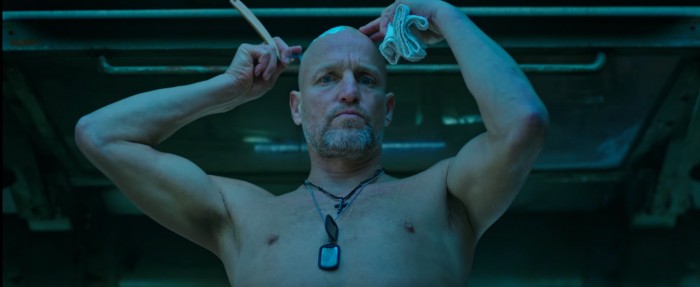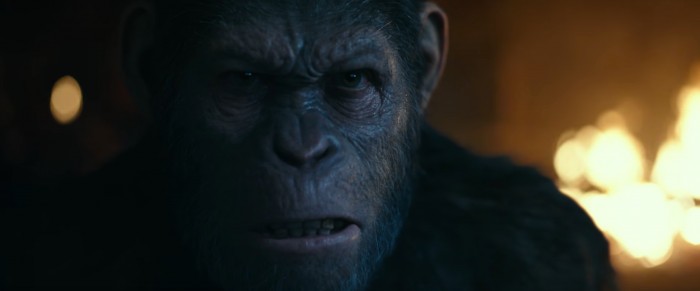'War For The Planet Of The Apes' Review: One Of The Most Significant Blockbusters Of The Decade
When news of a Planet of the Apes prequel franchise was first announced, plenty of people were skeptical, especially those who loved the classic film franchise that began in 1968 and spawned four sequels, a live-action TV series and an animated TV series. The 2001 remake directed by Tim Burton had already soured audiences all over the world. But 10 years later, we were all pleasantly surprised by Rise of the Planet of the Apes from director Rupert Wyatt, and even more enamored and impressed by the sequel, Dawn of the Planet of the Apes, from filmmaker Matt Reeves in 2014.
Now, Reeves has returned behind the camera for War for the Planet of the Apes, a film that is not only one of the most significant blockbusters of the decade, but the concluding chapter in what will be regarded as one of the all-time greatest film trilogies.
Our story picks up two years after Dawn of the Planet of the Apes, and for those who haven't seen the first two in this prequel franchise, some quick Star Wars crawl-esque text catches them up, albeit in an extremely abridged fashion. Soldiers are patrolling the woods, in search of apes still lingering in the area after the military was called in at the end of Dawn. The soldiers' helmets are marked with words like "monkey killer" as they move through the woods, waiting to wage an attack on a small outpost of apes.
War for the Planet of the Apes begins with a bang, quite literally, as gunfire and explosions echo through the woods in a battle that sees the soldiers and apes evenly matched with each other. The apes don't quite have the same firepower and weaponry as the human soldiers, but they more than make up for it with their physical capabilities and ingenuity. However, the humans have the benefit of having a few apes working with them. They're never recognized as equals – "donkey" has been painted on their back, which is exactly how they're always referred to by the humans. These defectors serve both as a kink in the chain of togetherness that makes the apes strong, but also evidence of how dire the fight between humanity and apes has become. They're just one of the many elements that makes this conflict between apes and humans rich with subtext and more complex beyond action spectacle.
Though this opening sequence is a master action setpiece (with more to follow), it's the subtext all throughout the film that makes this the most engaging installment of this new Planet of the Apes franchise. The commander behind the military force who will not relent in his pursuit of the apes is The Colonel (Woody Harrelson), the kind of leader who doesn't see mercy in having some of his surviving soldiers returned to him alive after this opening battle, but instead takes it as an opportunity to strike back for his losses by infiltrating the forest caves that the apes now call home.
Caesar (Andy Serkis) is not one to take this fight lying down, and he chooses to venture out on his own to track down The Colonel and end this conflict once and for all. Of course, his friends Maurice (Karin Konoval), Rocket (Terry Notary), and Luca (Michael Adamthwaite) lend their help, knowing that this could end very badly for all of them. Along their journey, they encounter a girl (Amiah Miller) who has become mute due to the evolution of the simian flu that wiped out a large chunk of humanity in the time between Rise and Dawn. They also encounter an odd but endearing ape calling himself "Bad Ape" (Steve Zahn), who has learned to speak despite being raised in a zoo away from Caesar's group.
They all make their way to a military compound on the border of California, where they anticipate more troops are coming to reinforce the base camp where The Colonel has his soldiers, each of them given an alpha and omega brand, the same one that their leader has emblazoned on the American flag. There's more going on here than our band of heroes realize though, creating a scenario that is reflective of iconic conflicts from history between two great leaders who have reached in impasse. But it's also reflective of today's America, crumbling under its own attempt to maintain superiority over those who won't conform rather than cooperating to survive in a world that will work for everyone. Everything in War for the Planet of the Apes is rich with subtext and substance. This sets up an incredible conclusion that belongs in the same vein of The Great Escape or The Bridge on the River Kwai.
Another stellar piece of the film is the score composed by Michael Giacchino. War for the Planet of the Apes has the kind of unique sounds that will make fans wish notes like this could be utilized for their favorite superhero blockbusters. There are distinct themes here that not only accompany the action well, but also inspire a swell of emotion during the more gripping and poignant scenes in the movie, of which there are many. The proceedings are further enhanced by the stunning cinematography by Michael Seresin. The movie is full of shots that feel like iconic photographs or paintings, and it demands to be seen on the biggest screen possible.
Thanks to the positively mind-blowing visual effects by WETA Digital, there's emotion in every scene as the you forget these apes are digital creations brought to life with computers and motion-capture performance technology. Subtle movements of the eyes, a quivering of the lip, and more all make these apes feel real, continuing to make a strong case for the actors who bring them to life to finally get some kind of recognition for their incredible work. Not only does Andy Serkis deserve an Oscar nomination as Best Actor, but Karin Konoval and Steve Zahn both make strong cases for supporting actor accolades as well.
But perhaps Matt Reeves' greatest achievement with War for the Planet of the Apes is making blockbuster sequels feel not only refreshing, but necessary. Though some audiences lament the lack of originality in an industry that loves to sequelize and remake everything, War for the Planet of the Apes stands as a shining example of the kind of filmmaking magic that can happen by using something familiar as inspiration to create something wholly remarkable. The serial storytelling also allows for a much more engaging story that sees characters change over time as they encounter new challenges.
With this trilogy of films, we follow Caesar through an evolution that feels similar to the journey that Wolverine has taken on the big screen, from his introduction in X-Men through this year's powerful Logan. Caesar isn't human, but he is a mutant, a product of human experiment, one who becomes a respected leader but also has to come to terms with the more troubling events that led to his place in his life, specifically his decision to kill the rebellious Koba in Dawn. It's the kind of character progression that has made the recent new golden age of television so compelling, and it can only exist on the big screen at this level by allowing several films to dig deep into characters. As to whether Caesar meets the same fate that Wolverine does in Logan, you'll have to watch this astounding and moving film to find out for yourself.
/Film Rating: 10 out of 10
***
War for the Planet of the Apes hits theaters on July 14.


